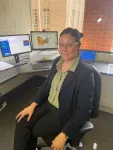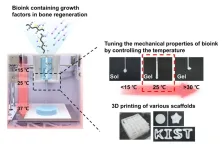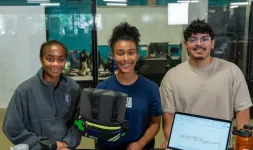(Press-News.org) PITTSBURGH, April 13, 2023 – In a paper published today in Molecular Psychiatry, a team of scientists from the University of Pittsburgh in collaboration with researchers in Italy described shared patterns of sleep disturbances and irregularities in daily rhythms of rest and activity across patients with schizophrenia spectrum disorder, or SSD.
By using wrist monitors that measured activity and rest as proxies of wakefulness and sleep, researchers found that individuals with SSD who resided in psychiatric hospitals and those who manage their condition in outpatient settings had erratic sleep patterns, dysregulated transitions between sleep and wake cycles, and excessively rigid daily routines that were predictive of worse SSD symptoms and correlated with poorer quality of life.
“Regulating sleep and wake cycles is important for your overall health and our findings can also be extended to people without underlying mental health conditions,” said associate professor of psychiatry and senior author of the study Fabio Ferrarelli, M.D., Ph.D. “Most people can benefit from better sleep hygiene and paying attention to their daily routines by incorporating activity and variety in their daily lives.”
Effects of disrupted sleep have long been studied in the context of physical and mental health, and well-established research literature suggests that people suffering from SSD have trouble falling asleep and get poorer rest than people without underlying mental health conditions.
In addition, sedative medications that are used to manage SSD symptoms are known to alter sleep and extend the time that patients spend resting up to 15 hours per day. Too much sleep can have negative consequences on patients’ SSD symptoms, says Ferrarelli.
“It’s important to be mindful of how drugs that we prescribe to patients affect their health more broadly,” he said. “Our study shows that a 12- to 15-hour sleep can be harmful, and it’s important to avoid overprescribing sedatives and use the lowest dose possible.”
In the study of 250 participants, including almost 150 residential and outpatient SSD patients representing one of the largest cohorts among published studies on sleep and SSD, the researchers measured participants' activity and rest throughout the day and night by asking them to wear a wristband that detects movement and acceleration.
The scientists did not track brain waves during sleep or distinguish between different phases of sleep – such as fast sleep and deep sleep – something that they plan on doing in future studies. Still, the results were strong and consistent.
They found that both residential and outpatient SSD individuals tended to have fewer active hours during the day and spent more time sleeping or passively resting than healthy controls.
In addition, residential patients had more fragmented sleep and more abrupt transitions between rest and activity compared to the outpatient group. Residential patients also displayed more rigid rhythms of daily rest and activity than outpatients, and those measures correlated with a greater degree of negative mental health symptoms, including reduced motivation to interact with others and blunted capacity for feeling pleasure.
“The consistency between the two patient cohorts was somewhat surprising to us,” Ferrarelli said. “But, interestingly, we found that residential patients had much more stable daily routines. We tend to think of stable routines as a good thing, but when these routines become too rigid, they can present a problem. In our study, this rigidity in daily rhythms was strongly correlated to the severity of negative mental health symptoms in residential patients with schizophrenia.”
The researchers say that it is not possible to use markers of disrupted sleep to diagnose SSD because of the symptoms’ overlap with other mental health conditions, such as dementia. But varying your daily routines and incorporating movement into your life are two simple steps that everyone can take to improve and protect their brain health.
“Especially as people get older, we tend to get deep into our routines,” said Ferrarelli. “Routines provide a sense of control to our lives and can be very beneficial. But if a routine is too rigid, it can backfire. Keeping your sleep schedule consistent while mixing up your daily tasks and splitting them across different days of the week is a good way to add variety to your schedule and improve your health long-term.”
Additional authors of the study include Ahmad Mayeli, Ph.D., Alice LaGoy, Ph.D., Stephen Smagula, Ph.D., James Wilson, Ph.D., all of Pitt as well as Giovanni de Girolamo, Ph.D., and the DIAPASON consortium from Italy.
This research was supported by the National Institute of Mental Health with the grant number R01 MH113827.
END
Disrupted rhythms of rest and wakefulness contribute to worse symptoms in schizophrenia patients
2023-04-14
ELSE PRESS RELEASES FROM THIS DATE:
How AI and a mobile phone app could help you quit smoking
2023-04-14
A stop smoking mobile app that senses where and when you might be triggered to light up could help people quit – according to University of East Anglia research.
Quit Sense is the world’s first Artificial Intelligence (AI) stop smoking app which detects when people are entering a location they used to smoke in. It then provides support to help manage people’s specific smoking triggers in that location.
Funding for the Quit Sense app has come from the National Institute for Health and Care Research (NIHR) and the Medical Research Council.
A study published today shows how the new ...
Nurse sounds a warning on hearing loss for COVID-19 patients
2023-04-14
A University of South Australia nursing lecturer has used her own COVID-19 experience to inform research into a little-known side effect of the virus – sudden deafness.
Kim Gibson, a registered nurse with a clinical background in neonatal intensive care, has documented her experience with sudden sensorineural hearing loss (SSNHL) five weeks after testing positive to COVID-19. She was fully vaccinated.
Her findings and recommendations are published in the latest edition of the British Medical Journal Case Reports.
Gibson developed acute hearing loss in one ear, along with ...
Scientists from Singapore and Sweden achieve promising results towards restoring vision in blindness caused by cellular degeneration in the eye
2023-04-14
SINGAPORE, 14 April 2023 – A preclinical study using stem cells to produce progenitor photoreceptor cells—light-detecting cells found in the eye—and then transplanting these into experimental models of damaged retinas has resulted in significant vision recovery. This finding, by scientists at Duke-NUS Medical School, the Singapore Eye Research Institute and the Karolinska Institute in Sweden, marks a first step towards potentially restoring vision in eye diseases characterised by photoreceptor loss.
“Our laboratory has developed a novel method that enables the production of photoreceptor ...
IOP Publishing celebrates World Quantum Day with the announcement of a special quantum collection and the winners of two prestigious quantum awards
2023-04-14
In celebration of World Quantum Day (14th April), IOP Publishing (IOPP) is launching a special collection of its most popular, cutting-edge quantum research published in the last two years.
The IOPP quantum collection is openly available for anyone to read and showcases world-class quantum research published in the academic journals Materials for Quantum Technology, Quantum Science and Technology, New Journal of Physics and Reports on Progress in Physics. The special collection will also include unique perspectives from women in quantum and their contributions to this popular field.
Quantum research and technology is evolving ...
Toppan and Hokkaido University launch Comprehensive Dementia Research Unit
2023-04-14
Tokyo – April 13, 2023 – Toppan (TYO: 7911), a global leader in communication, security, packaging, décor materials, and electronics solutions, and Hokkaido University have launched the “Comprehensive Dementia Research Unit,” an industry creation section that will collaborate with the Hokkaido University Collaborative Project Center’s Cognitive Science Research Center, which conducts comprehensive research on diagnosis technologies for dementia.
Fusing Toppan’s Digital ICA™1 technology for high-sensitivity ...
Safe bioink for artificial organ printing
2023-04-14
The development of biomaterials for artificial organs and tissues is active due to an increase in accidental injuries and chronic diseases, along with the entry into a super-aged society. 3D bioprinting technology, which uses cells and biomaterials to create three-dimensional artificial tissue structures, has recently gained popularity. However, commonly used hydrogel-based bioinks can cause cytotoxicity due to the chemical crosslinking agent and ultraviolet light that connect the molecular structure of photocuring 3D-printed bioink.
Dr. Song Soo-chang's research team at ...
Researchers turn to the power of native aquatic plants to clean coastal waters
2023-04-14
To find a fast, efficient way to clear harmful chemicals along the Gulf of Mexico coastline, researchers are turning to something already familiar with the task – several species of the aquatic grasses and rice that feel very much at home in murky coastal waters.
The research team led by University of Houston’s Venkatesh Balan, associate professor of biotechnology in the Cullen College of Engineering’s Division of Technology, studies the abilities of these water-loving flora to uptake concentrations ...
Rice U. engineering students’ brace puts patients first
2023-04-13
HOUSTON – (April 13, 2023) – Body image can have a significant impact on a person’s life, especially in their youth.
For those suffering from rib flaring associated with congenital deformations of the chest wall that cause it to jut out or cave in, a team of Rice University engineering students has come up with a potential solution.
Pectus carinatum and pectus excavatum are conditions in which a person is born with their breastbone protruding outward or sunken inward, respectively. There ...
PPPL hosts workshop on fusion energy and nonproliferation
2023-04-13
Public and private organizations around the world are developing fusion energy devices that could serve as models for fusion power plants. Scientists are striving to duplicate the fusion power that drives the sun and stars as a source of carbon-free energy to generate electricity without contributing to climate change.
While fusion plants could help meet global energy demands without emitting greenhouse gases and producing long-lived radioactive waste, they could also have risks — many of which were discussed at a two-day workshop hosted by the U.S. Department of Energy’s (DOE) Princeton Plasma Physics Laboratory ...
Nurses trained via virtual reality performed better than those trained by inpatient clinical training
2023-04-13
In search of novel tactics to accommodate a larger student body and fulfill workforce demands, nursing schools are developing new approaches to optimize learning, engage learners, and provide methods to ensure competency in future nursing graduates.
A recent study by Bethany Cieslowski, associate professor of Nursing, and colleagues found that immersive virtual reality (VR) training has been shown to be as effective as inpatient training for students learning to provide care for acute care pediatric ...








